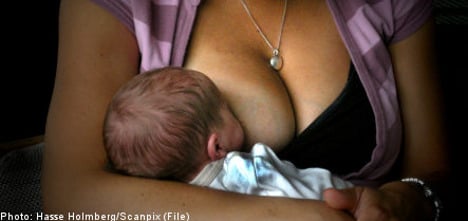For nine months, I was prodded and poked. As my belly grew bigger my blood pressure got higher. The midwife regularly quizzed me on my eating, sleeping and toilet habits. She compassionately handled my raging hormones and shared tips on relieving my swollen ankles.
As giving birth became ever more imminent, we discussed the finer points of pain relief alongside the joys of parenthood. Physically and emotionally, I was prepared – and I have nothing but praise for the medical professionals in Sweden who helped me bear my firstborn during a pretty hassle-free labour.
Over the course of those nine hours I was once again prodded and poked. Soon after my son’s primal scream into Sweden he was – immediately and without consultation – plonked on my breast to feed. It worked and there he stayed put for the best part of the three-day stay on the labour ward.
But he was a big lad – over four kilos and a born feeder. My balloon-sized breasts couldn’t keep up with his demands. And that kept us awake all night. Exhausted and exasperated, I asked for help and was given a breast pumping gadget and some random instructions.
But then it happened. In the early hours, with a crying baby in my arms I found a stash of formula and a microwave, seemingly hidden from view and certainly not talked about.
At no point during my pregnancy was I asked how I wanted to feed my baby. The pros and cons of breast versus formula were not up for discussion. I was advised to attend a breastfeeding demo at the health centre where a stern Swedish nurse informed me that nipple cream was of no use.
Like most other mothers-to-be, I had of course read up on the subject and referred to my largely loaned library of baby bibles. My decision was just to go with the flow, provided there was any, and feed as I saw fit.
If you can breast-feed, Sweden offers a haven of privacy, even in public. No one bats an eye when a mother whips out a boob to feed their baby, be it on a park bench, a bus or, my personal favourite, down the frozen vegetable aisle in the supermarket.
Yet Sweden makes a failure of mothers that can’t. Formula is as poo-poo’ed as a freshly filled nappy. Midwives will encourage the try-again method until mums shed more tears than their child and the only thing the doctor can prescribe to cure mastitis is a dose of antidepressants.
Sweden is, however, a beacon for the World Health Organisation’s recommendation on breastfeeding. The percentage of babies that are breast-fed for the first six months hits the high nineties here.
But providing those bodily-brewed nutrients comes at an unhealthy cost to the many mothers in Sweden who simply can’t produce.
Regardless, they often succumb to the pressure of the medical profession’s one-way philosophy that breast is best. Choice is rarely even a factor.
Sweden hasn’t found the right formula when it comes to finding a middle ground on breastfeeding.
What doesn’t add up is news of a prospective law to ensure milk of the powdered variety is used in the “right way.”
Instead of adding a legislative proposal as such it would perhaps be better to start taking away the guilt felt by mothers in Sweden that fail to breast-feed.



 Please whitelist us to continue reading.
Please whitelist us to continue reading.
Member comments